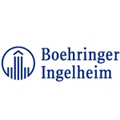 Porcine Reproductive and Respiratory Syndrome (PRRS), a virus that affects both growing piglets and adult pigs and leads to reproductive failure in breeding stock and respiratory tract illness, imposes a significant financial burden on swine producers all over the world: The total cost to the industry has been estimated at 1.5 billion EUR annually in the European Union alone.
Porcine Reproductive and Respiratory Syndrome (PRRS), a virus that affects both growing piglets and adult pigs and leads to reproductive failure in breeding stock and respiratory tract illness, imposes a significant financial burden on swine producers all over the world: The total cost to the industry has been estimated at 1.5 billion EUR annually in the European Union alone.
Developing new, practical PRRS control methods that are based on scientific evidence in addition to vaccination are highly relevant.

In 2014, Boehringer Ingelheim initiated the European PRRS Research Award to encourage studies into new means of combating PRRS and to further develop new practical methods for PRRS control: These practical methods can range from diagnostics to biosecurity and management. Every year, three outstanding research proposals are awarded with 75,000 EUR in total.
“The European PRRS Research Award brings science and veterinary practice together and promotes work that makes a difference for swine practitioners and their animals. We are pleased that the PRRS Award is so well received, and we are glad to support the promotion of excellent scientific work that has high value for practice,” shared Markus Hammer, Global Head of Swine at Boehringer Ingelheim.
This year, the independent award jury honored the work of scientists from four European countries:
- Diedrich Hendrickx, the Netherlands, and Merel Postma, Belgium, for the development of an ADKAR change management model to wean piglets free of PRRS wild type virus and understand the farmers objection towards a PRRS free future. The final goal of this project is to coach the farm how to set up and follow an individual PRRS control plan.
- Emil Lagumdzic, Austria, for the gene expression profiling of peripheral blood mononuclear cells and CD8+ T cells from gilts after PRRSV infection. Better understanding the role of immune responses can enable a targeted development of efficacious vaccines.
- Arnaud Lebret, France, for a descriptive study on PRRSV detection by qPCR in blood samples collected in positive stable herds following mass vaccination of sows with a MLV vaccine. Objectifying the frequency of detection of vaccine strains would help practitioners in their choice when implementing vaccinal strategies against PRRSV.
October 10, 2022 - Boehringer Ingelheim Animal Health


